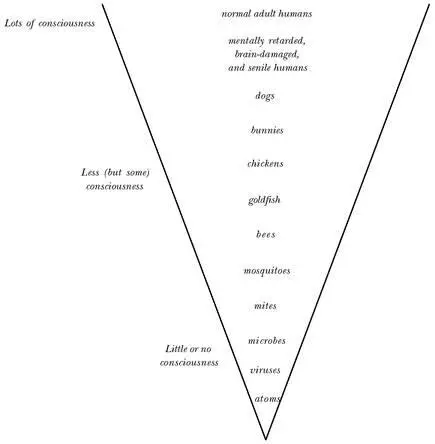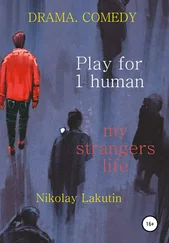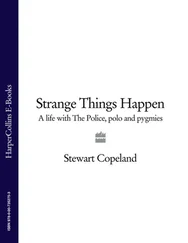Douglas Hofstadter - I Am a Strange Loop
Здесь есть возможность читать онлайн «Douglas Hofstadter - I Am a Strange Loop» весь текст электронной книги совершенно бесплатно (целиком полную версию без сокращений). В некоторых случаях можно слушать аудио, скачать через торрент в формате fb2 и присутствует краткое содержание. Жанр: Прочая документальная литература, на английском языке. Описание произведения, (предисловие) а так же отзывы посетителей доступны на портале библиотеки ЛибКат.
- Название:I Am a Strange Loop
- Автор:
- Жанр:
- Год:неизвестен
- ISBN:нет данных
- Рейтинг книги:4 / 5. Голосов: 1
-
Избранное:Добавить в избранное
- Отзывы:
-
Ваша оценка:
- 80
- 1
- 2
- 3
- 4
- 5
I Am a Strange Loop: краткое содержание, описание и аннотация
Предлагаем к чтению аннотацию, описание, краткое содержание или предисловие (зависит от того, что написал сам автор книги «I Am a Strange Loop»). Если вы не нашли необходимую информацию о книге — напишите в комментариях, мы постараемся отыскать её.
I Am a Strange Loop — читать онлайн бесплатно полную книгу (весь текст) целиком
Ниже представлен текст книги, разбитый по страницам. Система сохранения места последней прочитанной страницы, позволяет с удобством читать онлайн бесплатно книгу «I Am a Strange Loop», без необходимости каждый раз заново искать на чём Вы остановились. Поставьте закладку, и сможете в любой момент перейти на страницу, на которой закончили чтение.
Интервал:
Закладка:
I personally can attest to the terrifying technical difficulty of this incredible surging piece of music, having valiantly attempted to learn it when I was around sixteen and having sadly been forced to give it up in mid-stream, since playing just the first page up to speed (which I finally managed to do after several weeks of unbelievably arduous practice) made my right hand throb with pain. But the technical difficulty is, of course, not what Huneker was referring to. Quite rightly, he is saying that the piece is majestic and noble, but more controversially, he is drawing a dividing line between different levels or “sizes” of human souls, suggesting that some people are simply not up to playing this piece, not because of any physical limitations of their bodies, but because their souls are not “large enough”. (I won’t bother to criticize the sexism of Huneker’s words; that was par for the course in those days.)
This kind of sentiment does not go down well in today’s egalitarian America. It would not play in Peoria. Quite frankly, it rings terribly elitist, perhaps even repugnant, to our modern democratic ears. And yet I have to admit that I somewhat agree with Huneker, and I can’t help wondering if we don’t all of us implicitly believe in the validity of something vaguely like the idea of “small-souled” and “large-souled” human beings. In fact, I can’t help suggesting that this is indeed the belief of almost all of us, no matter how egalitarian we publicly profess to be.
Small-souled and Large-souled Humans
Some of us believe in capital punishment — the intentional public squelching of a human soul, no matter how ardently that soul would plead for mercy, would tremble, would shake, would shriek, would desperately struggle to escape, on being led down the corridor to the site of their doom.
Some of us, perhaps almost all of us, believe that it is legitimate to kill enemy soldiers in a war, as if war were a special circumstance that shrinks the sizes of enemy souls.
In earlier days, perhaps some of us would have believed (as did George Washington, Thomas Jefferson, and Benjamin Franklin, each in their own way, at least for some period of time) that it was not immoral to own slaves and to buy and sell them, breaking up families willy-nilly, just as we do today with, for example, horses, dogs, and cats.
Some religious people believe that atheists, agnostics, and followers of other faiths — and worst of all, traitors who have abandoned “the” faith — have no souls at all, and are therefore eminently deserving of death.
Some people (including some women) believe that women have no souls — or perhaps, a little more generously, that women have “smaller souls” than men do.
Some of us (myself included) believe that the late President Reagan was essentially “all gone” many years before his body gave up the ghost, and more generally we believe that people in the final stages of Alzheimer’s disease are essentially all gone. It strikes us that although there is a human brain couched inside each of those cranial shells, something has gone away from that brain — something essential, something that contains the secrets of that person’s soul. The “I” has either wholly or partly vanished, gone down the drain, never to be found again.
Some of us (again, I count myself in this group) believe that neither a just-fertilized egg nor a five-month old fetus possesses a full human soul, and that, in some sense, a potential mother’s life counts more than the life of that small creature, alive though it indisputably is.
Hattie the Chocolate Labrador
Kellie: After brunch we’re going out to see Lynne’s turkey, which we haven’t seen yet.
Doug: Which, or whom ?
Kellie: Which, I’d say. A turkey’s not a whom.
Doug: I see… So is Hattie a whom, or a which ?
Kellie: Oh, she’s a whom, no doubt.
Ollie the Golden Retriever
Doug: So how did Ollie enjoy the outing this afternoon at Lake Griffy?
Danny: Oh, he had a pretty good time, but he didn’t play much with the other dogs. He liked playing with the people, though.
Doug: Really? How come?
Danny: Ollie’s a people person.
Where to Draw that Fateful, Fatal Line?
All human beings — at least all sufficiently large-souled ones — have to make up their minds about such matters as the swatting of mosquitoes or flies, the setting of mousetraps, the eating of rabbits or lobsters or turkeys or pigs, perhaps even of dogs or horses, the purchase of mink stoles or ivory statues, the usage of leather suitcases or crocodile belts, even the penicillinbased attack on swarms of bacteria that have invaded their body, and on and on. The world imposes large and small moral dilemmas on us all the time — at the very least, meal after meal — and we are all forced to take a stand. Does a baby lamb have a soul that matters, or is the taste of lamb chops just too delicious to worry one’s head over that? Does a trout that went for the bait and is now helplessly thrashing about on the end of a nylon line deserve to survive, or should it just be given one sharp thwack on the head and “put out of its misery” so that we can savor the indescribable and yet strangely predictable soft, flaky texture of its white muscles? Do grasshoppers and mosquitoes and even bacteria have a tiny little “light on” inside, no matter how dim, or is it all dark “in there”? (In where ?) Why do I not eat dogs? Who was the pig whose bacon I am enjoying for breakfast? Which tomato is it that I am munching on? Should we chop down that magnificent elm in our front yard? And while I’m at it, shall I yank out the wild blackberry bush? And all the weeds growing right by it?
What gives us word-users the right to make life-and-death decisions concerning other living creatures that have no words? Why do we find ourselves in positions of such anguish (at least for some of us)? In the final analysis, it is simply because might makes right, and we humans, thanks to the intelligence afforded us by the complexity of our brains and our embeddedness in rich languages and cultures, are indeed high and mighty, relative to the “lower” animals (and vegetables). By virtue of our might, we are forced to establish some sort of ranking of creatures, whether we do so as a result of long and careful personal reflections or simply go along with the compelling flow of the masses. Are cows just as comfortably killable as mosquitoes? Would you feel any less troubled by swatting a fly preening on a wall than by beheading a chicken quivering on a block? Obviously, such questions can be endlessly proliferated (note the ironic spelling of this verb), but I will not do so here.
Below, I have inserted my own personal “consciousness cone”. It is not meant to be exact; it is merely suggestive, but I submit that some comparable structure exists inside your head, as well as in the head of each language-endowed human being, although in most cases it is seldom if ever subjected to intense scrutiny, because it is not even explicitly formulated.

Interiority — What Has it, and to What Degree?
It is most unlikely that you, a reader of this book, have missed all the Star Wars movies, with their rather unforgettable characters C-3PO and R2-D2. Absurdly unrealistic though these two robots are, especially as perceived by someone like myself who has worked for decades trying to understand just the most primordial mechanisms of human intelligence by building computational models thereof, they nonetheless serve one very useful purpose — they are mind-openers. Seeing C-3PO and R2-D2 “in flesh and blood” on the screen makes us realize that whenever we look at an entity made of metal or plastic, we are not inherently destined to jump reflexively to the dogmatic conclusion, “That thing is necessarily an inanimate object since it is made of ‘the wrong stuff ’.” Rather, we find, perhaps to our own surprise, that we are easily able to imagine a thinking, feeling entity made of cold, rigid, unfleshlike stuff.
Читать дальшеИнтервал:
Закладка:
Похожие книги на «I Am a Strange Loop»
Представляем Вашему вниманию похожие книги на «I Am a Strange Loop» списком для выбора. Мы отобрали схожую по названию и смыслу литературу в надежде предоставить читателям больше вариантов отыскать новые, интересные, ещё непрочитанные произведения.
Обсуждение, отзывы о книге «I Am a Strange Loop» и просто собственные мнения читателей. Оставьте ваши комментарии, напишите, что Вы думаете о произведении, его смысле или главных героях. Укажите что конкретно понравилось, а что нет, и почему Вы так считаете.












